From Sketch To Icon: The Evolution Of “Peanuts” By Charles Schulz
Charles Schulz was the creative mind behind Peanuts, one of the most beloved comic strips in American history. Schulz started drawing cartoons after World War II. Peanuts began in 1950 and introduced characters like Charlie Brown and Snoopy. Schulz’s humor and understanding of people made Peanuts very popular. The comic ran for over 50 years, winning Schulz many awards. Even though Schulz passed away, his work still brings joy to people everywhere.
The way Charles Schulz created Peanuts’ characters
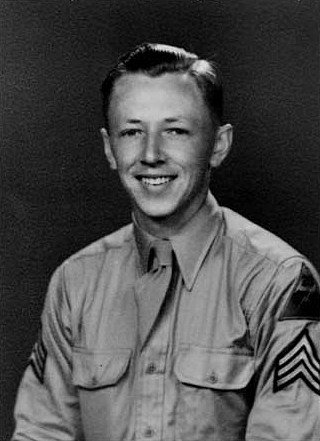
Military service influenced how Charles Schulz created the characters in Peanuts. “The three years I spent in the army taught me all I needed to know about loneliness,” Schulz wrote in “My Life with Charlie Brown”. “My sympathy for the loneliness that all of us experience is dropped heavily upon poor Charlie Brown.”
Schulz himself shared similarities with Charlie Brown. He was small, shy, and geeky, and often dwelled on his bad luck. According to David Michaelis’ 2007 biography “Schulz and Peanuts,” there was a real-life Little Red-Haired Girl who rejected Schulz’s affection.
Her name was Donna Mae Johnson, an Art Instruction Inc. accountant and Schulz fell in love with her. However, when he proposed to her in June 1950, she turned him down and married someone else.
Schulz received his draft notice in November 1942. This meant leaving behind his mother, who was suffering from cervical cancer. Despite this, he reported to Fort Snelling in Minnesota for induction into the service. Schulz made sure to visit his mother whenever he could on weekend passes and holiday furloughs.
During one of his trips, Schulz’s mother, from her sickbed, expressed a wish for the family to have a dog named Snoopy, a name similar to a common Norwegian term of endearment. Sadly, this never came to be as she passed away in February 1943, just a few days before Schulz left for basic training.
Arriving at Camp Campbell in Kentucky, Schulz was assigned to the 20th Armored Division. Fellow soldiers remembered him as homesick and visibly lonely. Schulz himself recalled tearful nights in his bunk as he mourned his mother amidst the rigors of combat training. However, during this time, his confidence grew.
On February 25, 1945, Schulz’s unit landed in France and trained at a chateau near Rouen in Normandy. Schulz often reminisced about the gray stone walls of this chateau, as he later wrote in a 1991 essay about finding inspiration for his comics.
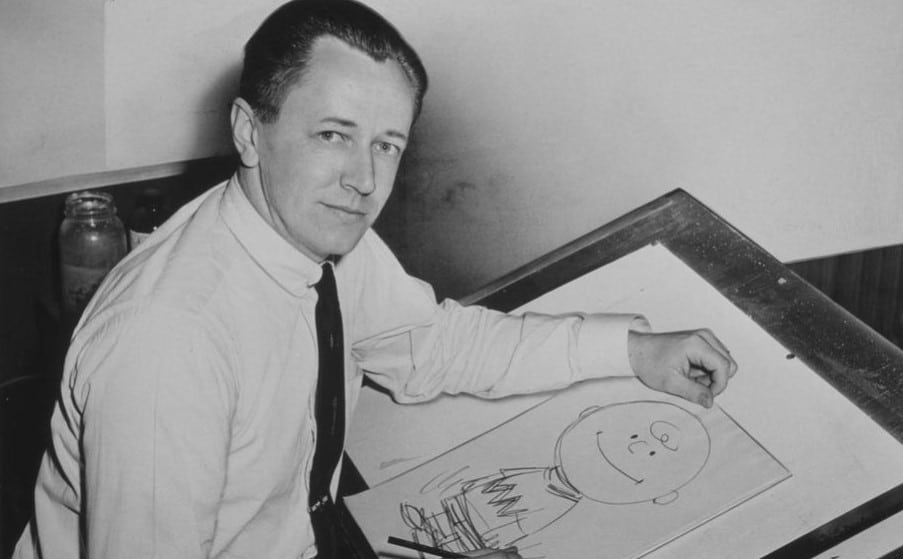
In the movie “Bon Voyage, Charlie Brown (and Don’t Come Back!!),” Charlie Brown and friends would spend a night at this chateau. Schulz’s unit journeyed 1,400 miles through Europe, eventually entering Germany and playing a role in the liberation of Dachau, according to the Charles M. Schulz Museum and Research Center.
There are a few interesting details about the connections between the characters in Peanuts and their creator, Charles Schulz.
– Just like Charlie Brown’s parents, Schulz’s dad worked as a barber, while his mom was a housewife.
– Linus and Shermy were named after Schulz’s good friends, Linus Maurer and Sherman Plepler.
– The character Peppermint Patty was inspired by Schulz’s cousin, Patricia Swanson, from his mother’s side. He came up with her name after spotting peppermint candies in his house.
– Sally affectionately refers to Linus as her “Sweet Babboo.” Schulz’s wife, Jean, used to call him that, and one day, it just appeared in the comic strip, inspired by her endearing term.
How “Peanuts” developed
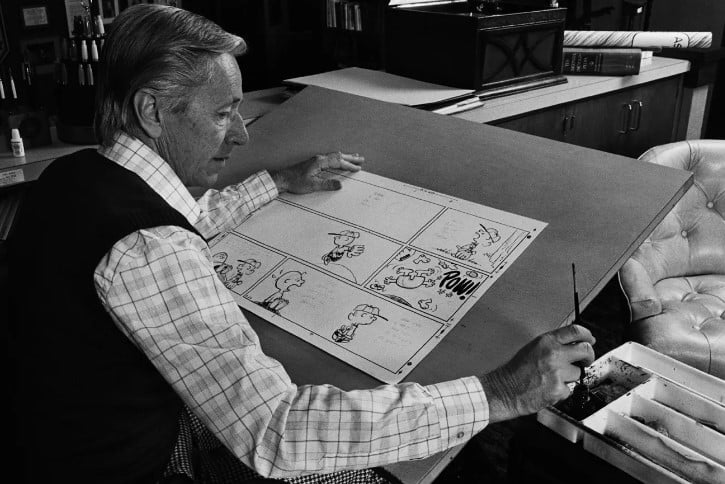
After the war, he developed his career as a comic creator. His first regular series, called Li’l Folks, consisted of one-panel jokes and ran from June 1947 to January 1950 in the St.
Paul Pioneer Press. Schulz typically created four one-panel drawings per issue. It was in Li’l Folks that Schulz first introduced the name Charlie Brown for a character, although he used it for multiple boys and even a dog that resembled Snoopy.
Schulz pitched Li’l Folks to United Feature Syndicate, who became interested. However, for legal reasons, the syndicate had to change the title of Schulz’s strip and chose the new name, Peanuts.
Peanuts first appeared on October 2, 1950, in seven newspapers, with the weekly Sunday page following on January 6, 1952. Although it started slow, Peanuts eventually became one of the most popular and influential comic strips of all time. Schulz briefly created another comic strip focused on sports, called It’s Only a Game (1957–59), but he stopped it once Peanuts took off.
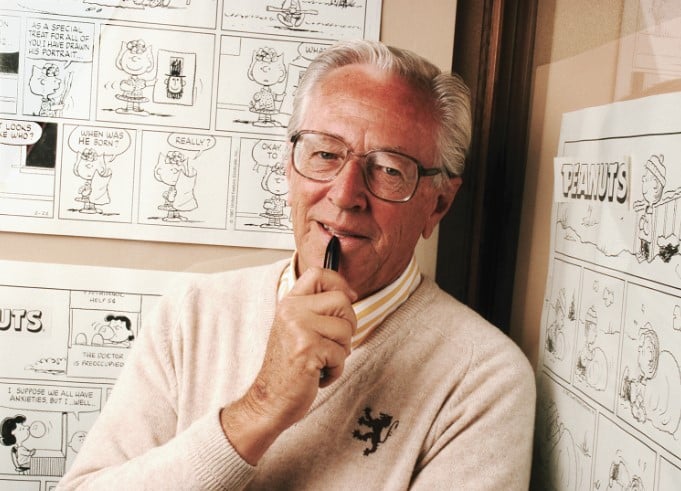
At its peak, Peanuts was published daily in 2,600 papers across 75 countries, translated into 21 languages. Over 5 decades, Schulz drew 17,897 published Peanuts strips. Alongside merchandise and endorsements, Peanuts generated over $1 billion in revenue annually, with Schulz earning an estimated $30 million to $40 million each year.
Schulz only took one vacation during the strip’s run—a five-week break in late 1997 to celebrate his 75th birthday. Reruns of the strip ran during his vacation, marking the only time this happened during Schulz’s life.
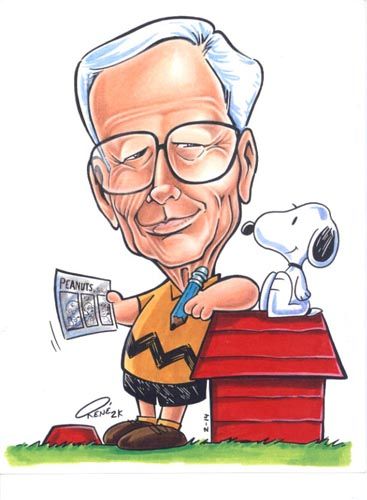
The first collection of Peanuts comic strips was published in July 1952 by Rinehart & Company, kicking off a series of books that greatly boosted the strip’s popularity. In 2004, Fantagraphics started their Complete Peanuts series, providing fans with comprehensive collections of the strips.
Peanuts also found success in other media, with the first animated TV special, A Charlie Brown Christmas, airing in December 1965 and winning an Emmy award. This success led to numerous TV specials, with the latest being Snoopy Presents: Welcome Home, Franklin in 2024. Until his passing, Schulz was involved in writing or co-writing the TV specials and closely supervised their production.

